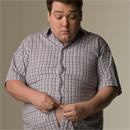Youths With Fat Chums Develop Teenage Obesity
Now there's increasing evidence that the company a teen keeps may have an effect on more than only their taste in clothes and music. It might also impact their weight and dieting habits.
Some recent U.S. research out of the University of Hawaii uncovered a strong link between the weight of teens and their closest peers.
While teenagers are still sure to eat some of their meals with with peers that researchers suspect offer chances to influence each other's food selections and eating habits.
Levels of activity are likely to be gained in the same way, and everyone knows how limited exercise is in the teenager sector of computer games and television. A recent survey has an astonishing 25% of young folk aged 12-21 reporting no severe activity as a part of their day.
The study, appearing in the journal Economics and Human Biology raises the concept of imitative obesity.
Data on nearly five thousand kids reveals that friendships tended to be grouped according to weight. Large kids hung out with others of the same weight and slimmer kids did the same.
Plenty of the teens took part in a chase up after two years that revealed that having a fat chum could lead to weight gain as time went on.
This study can't say for sure whether fat youths inspire pals to be heavier, or if heavier teens just naturally find one another. Heaps of times teens carrying more weight are scorned by thinner peers, leaving them to befriend each other.
As we know, the nasty habits of eating unhealthy food and not exercising are dangerous trends for any one, especially the young.
Finding out if a teenager is large is more of a challenge than you might think as kids at this age are still growing and are more deeply influenced.
As we know, body types are different, even those of the same height can be kind of muscly or further developed, and this discrepancy is perfectly ordinary.
And BMI charts for teens ( one for men, one for girls ) use percentile lines to let you compare your own BMI with those of a very big group of the same age and sex.
Being obese, even at this age, is not just about how you look, it's also about how you feel and the fitness of your body. Kids often feel just like nothing bad can ever happen to them, but being obese can affect your joints, respiring, mood, energy levels and sleep - almost each area of your life. And not in a good way.
What's worse, teenage obesity boosts the chance of being diagnosed with Problems that used to be found only in adults. High cholesterol, high blood pressure and type two diabetes to cite a couple.
Related Articles
-
They Laughed When I Told Them This Simple Weight Loss Remedy Melts Away Fat
-
How To Efficiently Lose Weight, Build A Better Body And Attain And Maintain Optimal Health-Forever!
-
How to Enjoy Your Favorite Food Without Gaining Extra Pounds
-
6 Great Ways to Enjoy Your Low Carb Diet
-
Lose weight and Keep it off Permanently Without Fancy Diets
-
Weight Watchers And Soda
- DON'T MISS
- All Access To Their Dieting Secrets!
- The South-Beach Diet? Huh! Why Not Relax Yourself Slimmer?
- Flat Belly Remedies
- The Basics Of Working Out And Building Muscle
- Lifestyle Diets
- Lose Weight – Do You Really Need To?
- Burn Excess Fat and Reduce Obesity with HCG Ultra Drops
- Proper Goal Setting For Health And Fitness
- Good Food/Bad Food What’s Left to Eat?
- Is your workplace a hazard for your diet?




